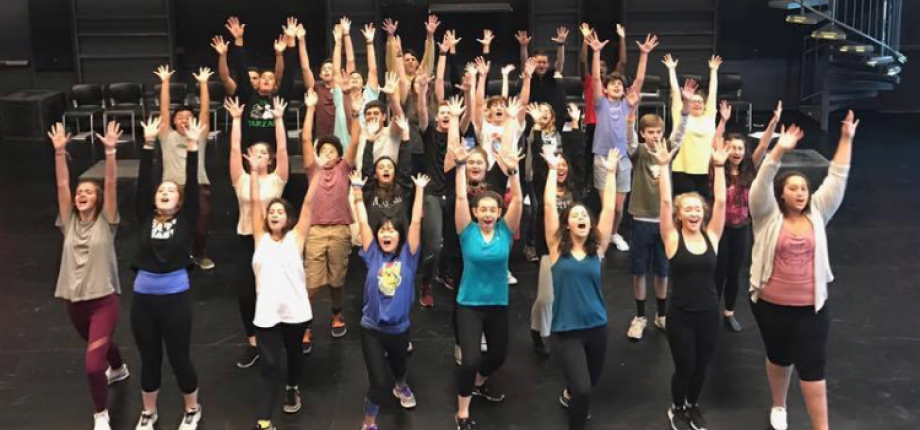Filichia Features: Matilda - This Little Girl Goes Junior

Filichia Features: Matilda - This Little Girl Goes Junior
Faithful readers will recall my column last week about iTheatrics, the marvelous company that adapts and abridges Broadway musicals for tweens. What justice they did in shortening Newsies into Newsies JR.
Happily, it’s only one of three Broadway musicals that the company is developing this summer. The second jewel of the triple crown is, as it’s billed Roald Dahl’s Matilda the Musical JR. If all parties are pleased, in time it will be available for productions in middle schools around the world.
On Broadway, Matilda ran more than three years, and in London it’s still on the boards as it approaches its sixth anniversary.
Note that the 1996 non-musical film of Dahl’s novel was set in these United States – which resulted in each word being easily understood. So credit director Timothy Allen McDonald followed that lead and didn’t have his 53 (!) cast members affect British accents.
McDonald also made no attempt to duplicate the show’s actual opening in which kids swing on swings; one of those 53 could get in the way and suddenly lose a front tooth. No, the only swings that should be seen in any Matilda JR. should be the kids who have been assigned to be understudies.
Instead McDonald ordered two levels’ worth of staggered blocks: four on the bottom row, three at the top. Each block sported a letter that did its part to spell out MATILDA.
But wait! The blocks’ other five faces had painted letters, too; they were turned this way and that to make other words throughout the show. The kids enlisted to spin the blocks were an error-free well-oiled machine.
The first new word was miracle, for that’s the focus of the first song; here the kids insist that this noun is the one their “mummies” use in defining them.
Such validation could make a kid a brat. Perhaps that’s why Matilda Wormwood isn’t. The poor soul had the terrible luck to be born into a family of ignoramuses whose idea of miracle is more likely to be Miracle Whip.
In front of the television is where Mom, Dad and Brother Wormwood spend their time. Hence, there’s even a song celebrating the boob tube.
Matilda instead gets her stories the old-fashioned way: she reads. “Would you like to hear a story?” the girl asks her mother, who responds “Don’t be disgusting!” Mom’s advice to her child? “Looks are more important than books.”
Matilda’s father can’t even “read” his own daughter and truly believes she’s a boy; that’s how much attention he pays her. Meanwhile, brother Michael, whose I.Q. can be measured out in coffee spoons, lords it over her that he’s the favored child.
In the full musical version, Matilda luckily has a teacher and librarian on her side. As of now, the JR. version only has the former on hand: Miss Honey, who’s as afraid of Miss Trunchbull, the horrid headmistress of Crunchem (!) Hall, as are the students. This character has always been played by a male both in London and on Broadway, and McDonald saw no need to break with tradition.
“Children are maggots,” Miss Trunchbull insists. Could this be because she’s never seen a performance by Crunchem Hall’s drama club? If she’d seen the four-dozen-plus performers singing, dancing and acting here at The 52nd Street Project, her heart would have melted faster than a waterlogged Wicked Witch of the West.
One must admit that Matilda isn’t always on the up-and-up.
“Sometimes you have to be a little bit naughty,” she decides while enacting her revenge on her father. The dolt barely has a head on his shoulders, but after Matilda fools around with some chemicals, that head is full of green hair. (Those aforementioned blocks were quite useful in hiding the emerald-colored wig that the lad had to don.)
We all know that two wrongs don’t make a right, but you try growing up in a house like this and see how well you do. Matilda JR. will never be accused of soft-pedaling. It must also be the first musical to use the word “snot.”
Important lessons can still be learned. The possibility exists that many of the 53 in this production will forge careers as teachers; if so, they may well remember Miss Honey’s attentiveness, love and, to be sure, frankness. One of the show’s most touching moments comes when Miss Honey must admit to Matilda “I’m not strong like you.”
There’s good reason for it: Miss Trunchbull has a secret hold on Miss Honey, so it’s up to Matilda to prove her own strength by flat-out accusing “You bully!” And that’s one solid reason why Matilda JR. will thrive, for we’re finally in a time in world history when bully-shaming – a term that didn’t even exist a generation ago – is now at the forefront of school policy.
In the end, we saw that the kids who sang “When I Grow Up” at the start of the show proved that they were already grown-up, in that they’re true professionals in the way they conducted themselves. Here’s betting that your kids will rise to the Matilda JR. challenge when they get the chance.
You may e-mail Peter at pfilichia@aol.com. Check out his weekly column each Monday at www.broadwayselect.com and Tuesday at www.masterworksbroadway.com. His book, The Great Parade: Broadway’s Astonishing, Never-To-Be Forgotten 1963-1964 Season is now available at www.amazon.com.

























